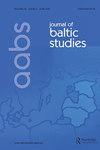Writing bi- and multilingual occasional poetry in the seventeenth century Academia Dorpatensis – a rather acceptable practice at the time?
IF 0.5
4区 社会学
Q2 AREA STUDIES
引用次数: 0
Abstract
ABSTRACT The early modern Academia Dorpatensis provides over 2,300 printed academic occasional poems within the period of 1632–1710. Among them there are as many as 58 occasional poems printed within the period of 1636–1705, which could be considered as bi- or even multilingual. In terms of sub-genres, wedding poems (epithalamia), funeral poems (epicedia), valedictory poems (propemptica), and gratulatory poems (gratulatoria) all comprise several examples in which poems are written in both classical and vernacular languages. The focal point of this article, however, are those poems in which either classical languages, classical language(s) and vernacular(s), or vernaculars appear together in the same poem. These bi- and multilingual poems will be analyzed in terms of linguistics, also providing the criteria and methodology for studying these poems.在17世纪偶尔写两种和多种语言的诗歌在当时是一种相当可以接受的做法吗?
本文章由计算机程序翻译,如有差异,请以英文原文为准。
求助全文
约1分钟内获得全文
求助全文
来源期刊

Journal of Baltic Studies
AREA STUDIES-
CiteScore
1.20
自引率
0.00%
发文量
52
期刊介绍:
The Journal of Baltic Studies, the official journal of the Association for the Advancement of Baltic Studies (AABS), is a peer-reviewed, multidisciplinary journal for the purpose of advancing the accumulation of knowledge about all aspects of the Baltic Sea region"s political, social, economic, and cultural life, past and present. Preference is given to original contributions that are of general scholarly interest. The Association for the Advancement of Baltic Studies is an international, educational, and scholarly non-profit organization. Established in 1968, the purpose of the Association is the promotion of research and education in Baltic Studies.
 求助内容:
求助内容: 应助结果提醒方式:
应助结果提醒方式:


